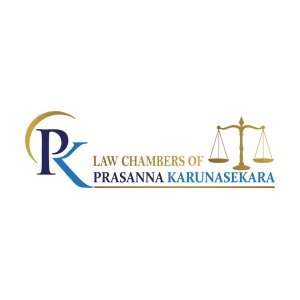Best Landlord & Tenant Lawyers in Kiribathgoda
Share your needs with us, get contacted by law firms.
Free. Takes 2 min.
Free Guide to Hiring a Real Estate Lawyer
List of the best lawyers in Kiribathgoda, Sri Lanka
About Landlord & Tenant Law in Kiribathgoda, Sri Lanka
Landlord & Tenant law in Kiribathgoda, Sri Lanka governs the relationship between landlords and tenants in the rental market. It provides rights and responsibilities for both parties, ensuring a fair and harmonious rental experience.
Why You May Need a Lawyer
There are several situations where it may be beneficial to seek legal help in Landlord & Tenant matters:
- Disputes over rental agreements or lease terms
- Unresolved issues regarding rent payments or security deposits
- Eviction proceedings and related legal matters
- Violation of tenant rights or illegal actions by the landlord
- Negotiating and drafting rental contracts
Local Laws Overview
In Kiribathgoda, Sri Lanka, the following key aspects of local laws are relevant to Landlord & Tenant:
- The Rent Act of 1972 governs the relationship between landlords and tenants and provides comprehensive regulations regarding rent increases, eviction procedures, and tenant rights.
- Both oral and written rental agreements are legally binding, but it is always recommended to have written agreements to avoid misunderstandings.
- Security deposits cannot exceed three months' rent and must be returned to the tenant within one month of the lease termination, minus any unpaid rent or needed repairs.
- A landlord must provide reasonable notice before entering the rental premises, except in cases of emergency.
- Eviction can only be done through a court order and certain conditions must be met, such as non-payment of rent or violation of the terms of the rental agreement.
Frequently Asked Questions
Q: Can a landlord increase the rent at any time?
A: No, a landlord can only increase the rent once in every two years. The increase must be reasonable and adhering to the regulations set forth in the Rent Act.
Q: What remedies do I have if my landlord fails to return my security deposit?
A: If your landlord fails to return your security deposit within one month of lease termination, you can file a complaint with the Rent Board. They will mediate the dispute and ensure a fair resolution.
Q: Can my landlord evict me without a court order?
A: No, a landlord cannot evict a tenant without a court order. They must follow the proper legal procedure and obtain a court order to evict a tenant for non-payment of rent or any other violation of the rental agreement.
Q: Do I need a written rental agreement?
A: While oral rental agreements are legally binding, it is always recommended to have a written agreement. Written agreements provide clarity and serve as evidence in case of any disputes.
Q: Where can I report illegal actions or violations by my landlord?
A: If you believe your landlord is engaging in illegal actions or violating your rights as a tenant, you can report the matter to the local police or seek legal advice from a lawyer specializing in Landlord & Tenant law.
Additional Resources
If you require further information or assistance regarding Landlord & Tenant matters in Kiribathgoda, Sri Lanka, you can refer to the following resources:
- Kiribathgoda Rent Board - Contact them for guidance on rental disputes and grievance procedures.
- Kiribathgoda Lawyers Association - Seek legal advice and representation from lawyers specializing in Landlord & Tenant law.
Next Steps
If you require legal assistance in Landlord & Tenant matters in Kiribathgoda, Sri Lanka, here are the recommended steps to follow:
- Identify your specific issue or concern related to Landlord & Tenant.
- Consider consulting with a lawyer specializing in Landlord & Tenant law.
- Gather all relevant documents, such as rental agreements, correspondence, and evidence of any violations.
- Schedule a consultation with a lawyer to discuss your case in detail.
- Follow the lawyer's guidance and proceed with legal action if necessary.
Lawzana helps you find the best lawyers and law firms in Kiribathgoda through a curated and pre-screened list of qualified legal professionals. Our platform offers rankings and detailed profiles of attorneys and law firms, allowing you to compare based on practice areas, including Landlord & Tenant, experience, and client feedback.
Each profile includes a description of the firm's areas of practice, client reviews, team members and partners, year of establishment, spoken languages, office locations, contact information, social media presence, and any published articles or resources. Most firms on our platform speak English and are experienced in both local and international legal matters.
Get a quote from top-rated law firms in Kiribathgoda, Sri Lanka — quickly, securely, and without unnecessary hassle.
Disclaimer:
The information provided on this page is for general informational purposes only and does not constitute legal advice. While we strive to ensure the accuracy and relevance of the content, legal information may change over time, and interpretations of the law can vary. You should always consult with a qualified legal professional for advice specific to your situation.
We disclaim all liability for actions taken or not taken based on the content of this page. If you believe any information is incorrect or outdated, please contact us, and we will review and update it where appropriate.








